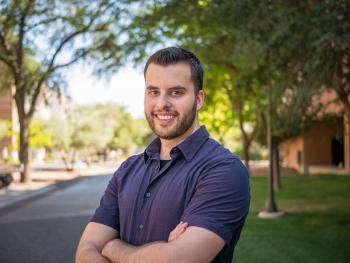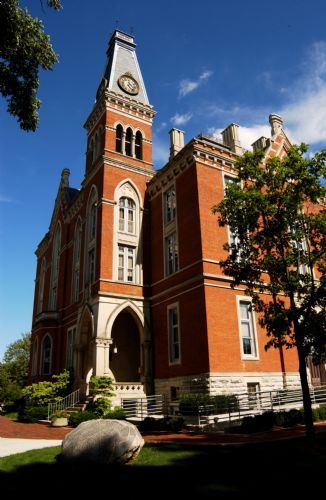News & Media
Psychology Research of Andres Munoz '14 for the Human Generosity Project is Spotlighted
June 20, 2018
 The research of Andres Munoz, a 2014 graduate of DePauw University and now a doctoral student in the Arizona State University Department of Psychology, "studies cooperation from an evolutionary perspective and what happens when it breaks down," notes an ASU article. "In the past, most researchers studying cooperation from an evolutionary perspective have focused on rules like reciprocity, where individuals pay each other back for helping each other. What Munoz is looking at is different: He is examining other rules for cooperation that are based on the need of the recipient rather than based on the expectation of being repaid."
The research of Andres Munoz, a 2014 graduate of DePauw University and now a doctoral student in the Arizona State University Department of Psychology, "studies cooperation from an evolutionary perspective and what happens when it breaks down," notes an ASU article. "In the past, most researchers studying cooperation from an evolutionary perspective have focused on rules like reciprocity, where individuals pay each other back for helping each other. What Munoz is looking at is different: He is examining other rules for cooperation that are based on the need of the recipient rather than based on the expectation of being repaid."
The piece continues, "His focus is specifically on 'cheater detection,' or how people know when individuals deviate from social rules in pursuit of a personal benefit at a cost to someone else. In particular, he is interested in the cognitive mechanisms that allow people to detect stinginess and greediness ... His research project is part of the Human Generosity Project ... a multidisciplinary project funded in part by the National Institutes of Health and the John Templeton Foundation. The goal is to understand the nature and evolution of human cooperation, and the researchers use fieldwork, laboratory experiments and computational modeling."
 The story points out, "Munoz started at DePauw University as an economics major, but he quickly realized he wanted to study how people think and work toward beneficial societal change."
The story points out, "Munoz started at DePauw University as an economics major, but he quickly realized he wanted to study how people think and work toward beneficial societal change."
Munoz wound up with an undergraduate degree in psychology and was an Honor Scholar whose thesis was "From Passive Receptacles to Active Contenders: The Moderating Effects of Rival and Mate Cues on the Relationship Between Ovulation and Intrasexual Competition Among Human Females."
Kevin E. Moore, director of Honor Scholar Program and Kenneth S. Wagoner Professor of Psychology and Neuroscience, recalls, "The thesis looked at how work on the biology and psychology of human female ovulation helped lead science to view women as active and powerful agents, rather than as the passive players that both our culture and older scientific approaches made them out to be."
Read more here.
Contact Us
Communications & Marketing

Bob Weaver
Senior Director of Communications
- bobweaver@depauw.edu
- (765) 658-4286
-
201 E. Seminary St.
Greencastle, IN 46135